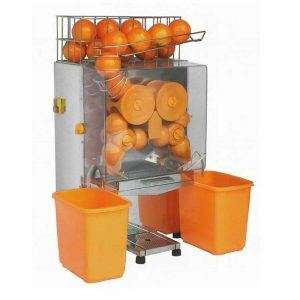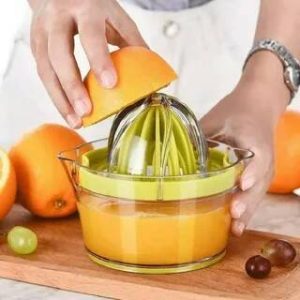Orange Squeezer Juice Maker is a type of kitchen appliance that is designed to extract juice from oranges and other citrus fruits. It typically consists of a motorized base, a juicing cone, and a juice collector.
To use an Orange Squeezer Juice Maker, you simply cut an orange in half, place it on the juicing cone, and press down on the fruit. The juicing cone rotates, extracting the juice from the orange, and the juice flows into the collector. The collected juice can then be poured into a glass or container.
Some Orange Squeezer Juice Makers may come with additional features, such as multiple juicing cones for different sizes of fruit, a pulp control feature, or a drip stop spout to prevent spills.
Orange Squeezer Juice Makers are a convenient and easy way to make fresh citrus juice at home. They can be used to make juice for drinking, as well as for use in recipes that call for fresh orange juice. They are also relatively easy to clean, with most models featuring removable parts that can be washed in the sink or dishwasher.
Types
There are several types of juicers that can be used specifically for oranges. Here are some of the most common types:
Manual Citrus Juicers: These are simple handheld devices that allow you to manually juice oranges and other citrus fruits. They typically consist of a juicing cone and a collection cup and require you to manually apply pressure to the fruit to extract the juice. Manual citrus juicers are inexpensive and easy to use, but they can be time-consuming if you need to juice a large quantity of oranges.
Electric Citrus Juicers: These are motorized devices that are designed to juice citrus fruits quickly and efficiently. They typically have a motorized juicing cone and a collection cup and can handle larger quantities of fruit than manual juicers. Electric citrus juicers are generally more expensive than manual juicers, but they are faster and more efficient.
Centrifugal Juicers: These are high-speed juicers that can be used to juice a variety of fruits and vegetables, including oranges. They work by spinning a blade at high speeds to separate the juice from the pulp. Centrifugal juicers can produce a lot of juice quickly, but they can also be quite loud and may not be as efficient as electric citrus juicers when it comes to extracting juice from citrus fruits.
Masticating Juicers: These are slow-speed juicers that use a crushing and squeezing action to extract juice from fruits and vegetables. Masticating juicers are more versatile than other types of juicers and can be used to juice a wide range of produce, including oranges. They are also more efficient than centrifugal juicers when it comes to extracting juice from citrus fruits. However, they are generally more expensive and may require more https://www.buydo.eu time and effort to clean.
Electric Citrus Juicers
Electric citrus juicers are motorized devices that are specifically designed to extract juice from citrus fruits, such as oranges, lemons, and grapefruits. They typically consist of a motorized juicing cone and a collection cup, and they work by pressing the fruit onto the juicing cone while the motor rotates the cone to extract the juice.
One of the main advantages of electric citrus juicers is that they are fast and efficient. They can juice large quantities of citrus fruits in a short amount of time, which makes them ideal for use in commercial settings or for making large batches of juice at home.
Electric citrus juicers also tend to be very easy to use. Simply cut the citrus fruit in half, place it onto the juicing cone, and press down. The motorized cone will then rotate to extract the juice, which will flow into the collection cup.
Another advantage of electric citrus juicers is that they often come with adjustable settings that allow you to control the amount of pulp in the juice. Some models also come with different sizes of juicing cones, which makes them versatile enough to handle a variety of citrus fruits.
When choosing an electric citrus juicer, it’s important to consider factors such as the size of the juicing cone, the capacity of the collection cup, and the ease of cleaning. Some models may also have additional features such as a drip-stop spout to prevent spills or a pulp control feature to adjust the amount of pulp in the juice.
Overall, electric citrus juicers are a convenient and efficient way to make fresh citrus juice at home or in a commercial setting. They are relatively affordable and can be a great addition to any kitchen or business that needs to juice large quantities of citrus fruits.

Advantages and disadvantages
Advantages:
- Fast and efficient: Electric citrus juicers can juice large quantities of citrus fruits quickly and efficiently, making them ideal for use in commercial settings or for making large batches of juice at home.
- Easy to use: Electric citrus juicers are very easy to use. Simply cut the citrus fruit in half, place it onto the juicing cone, and press down. The motorized cone will then rotate to extract the juice, which will flow into the collection cup.
- Adjustable settings: Many electric citrus juicers come with adjustable settings that allow you to control the amount of pulp in the juice. Some models also come with different sizes of juicing cones, which makes them versatile enough to handle a variety of citrus fruits.
- Versatile: Electric citrus juicers can be used to juice a variety of citrus fruits, including oranges, lemons, and grapefruits.
Disadvantages:
- Limited use: Electric citrus juicers are designed specifically for citrus fruits and may not be suitable for other types of fruits and vegetables.
- Price: Electric citrus juicers can be more expensive than manual citrus juicers, which may be a disadvantage for some people.
- Noise: Some electric citrus juicers can be quite loud when in use, which may be a disadvantage if you want to make juice early in the morning or late at night.
- Cleaning: Electric citrus juicers may require more effort to clean than manual citrus juicers, which can be a disadvantage if you are short on time or don’t like to clean up after cooking.
Centrifugal Juicers:
Centrifugal juicers are one of the most common types of juicers used for making orange juice. They work by using a high-speed spinning blade to chop up the fruit and then separate the juice from the pulp using a centrifugal force. Here are some of the advantages and disadvantages of using centrifugal juicers for making orange juice:
Advantages:
- Speed: Centrifugal juicers are very fast and can produce a large quantity of orange juice in a short amount of time.
- Affordable: Centrifugal juicers are usually more affordable than other types of juicers, making them accessible for many people.
- Easy to use: Centrifugal juicers are very easy to use. Simply cut the oranges into quarters or halves, and then feed them into the juicer.
- Easy to clean: Most centrifugal juicers have parts that can be easily removed and washed in a dishwasher.
Disadvantages:
- Oxidation: Centrifugal juicers generate heat and air during the juicing process, which can lead to oxidation and a loss of nutrients in the juice.
- High-speed operation: The high-speed spinning blade in centrifugal juicers generates heat and can destroy some of the enzymes and nutrients in the orange juice.
- Noise: Centrifugal juicers can be very noisy during operation, which can be disruptive in some settings.
- Pulp: Centrifugal juicers tend to produce juice with more pulp than other types of juicers. While some people may prefer this, others may find it unpleasant.
Overall, centrifugal juicers are a popular and affordable option for making orange juice, but they may not be the best choice for those who are looking to get the most nutrients from their juice. If nutrient preservation is a priority, then other types of juicers such as masticating or cold press juicers may be more suitable.
Masticating Juicers:
Masticating juicers are not typically used for citrus fruits like oranges, as they are designed for juicing leafy greens, hard vegetables, and fruits like apples and pears. However, some masticating juicers may have a citrus press attachment that can be used to juice oranges and other citrus fruits.
Here are some advantages and disadvantages of using a masticating juicer with a citrus press attachment for making orange juice:
Advantages:
- Nutrient retention: Masticating juicers work at low speeds and use a pressing motion, which helps to retain more nutrients in the juice compared to other types of juicers.
- Less oxidation: Masticating juicers operate at slower speeds, which means that there is less heat generated during the juicing process. This reduces the amount of oxidation in the juice and preserves the taste and nutritional content.
- Better juice yield: Masticating juicers are very efficient and can extract more juice from oranges compared to other types of juicers.
- Less foam: Masticating juicers produce less foam than centrifugal juicers, which results in a smoother and more enjoyable drinking experience.
Disadvantages:
- Slow: Masticating juicers work at slower speeds, which means that it takes longer to produce a glass of orange juice.
- Expensive: Masticating juicers tend to be more expensive than other types of juicers.
- Cleaning: Masticating juicers can be more difficult to clean than centrifugal juicers, as they have more parts that need to be disassembled and washed.
Overall, while masticating juicers with citrus press attachments can be used to juice oranges, they may not be the best choice for those looking for a fast and affordable juicing option. However, if you are looking for the most nutrient-rich and highest quality orange juice possible, a masticating juicer with a citrus press attachment may be a good investment.
